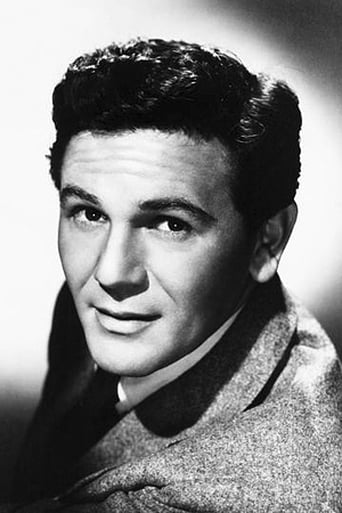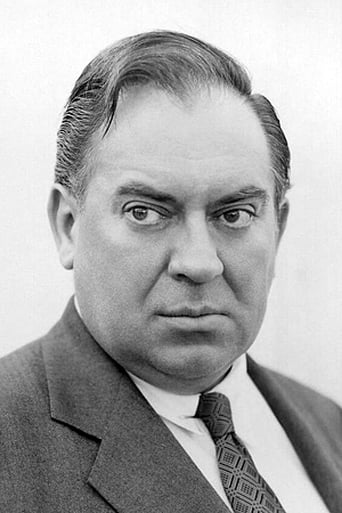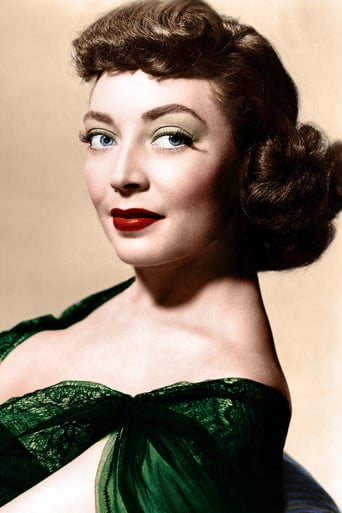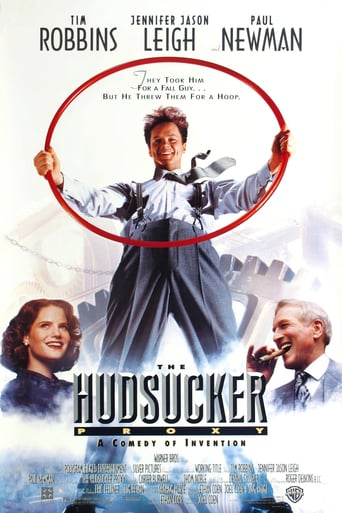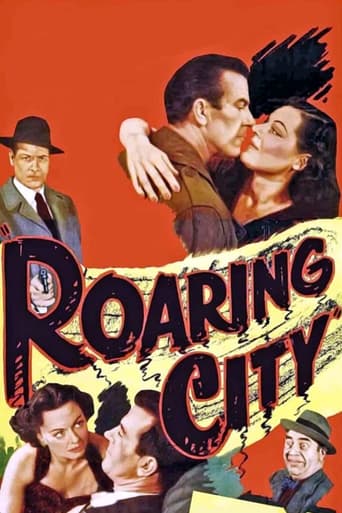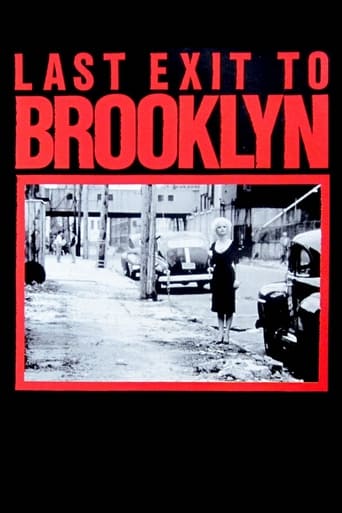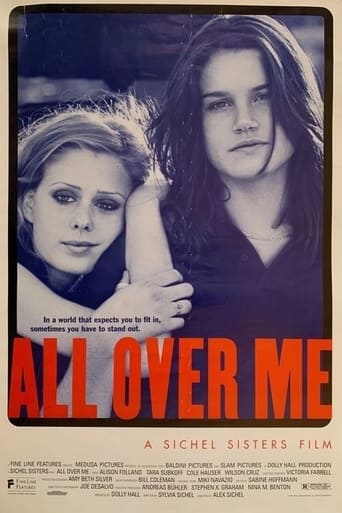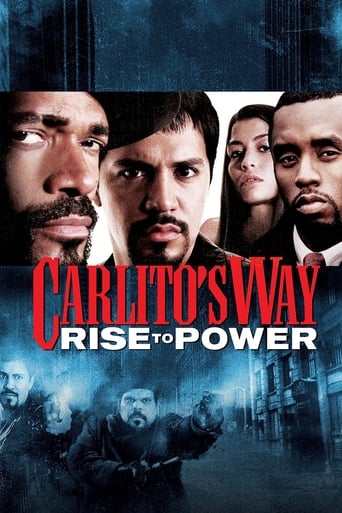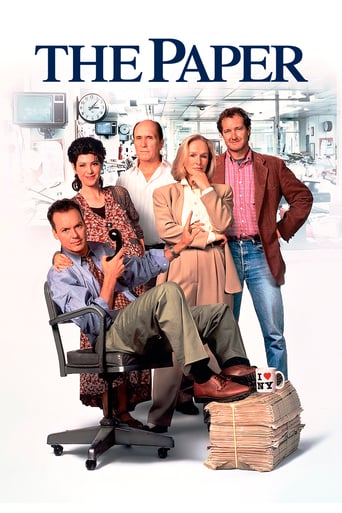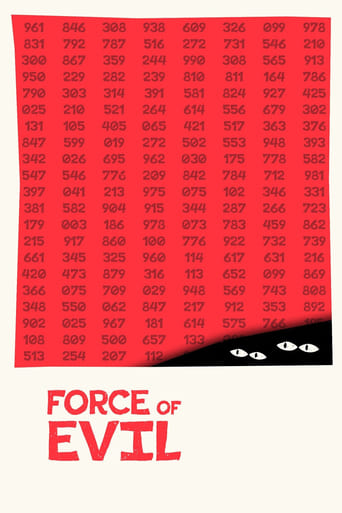
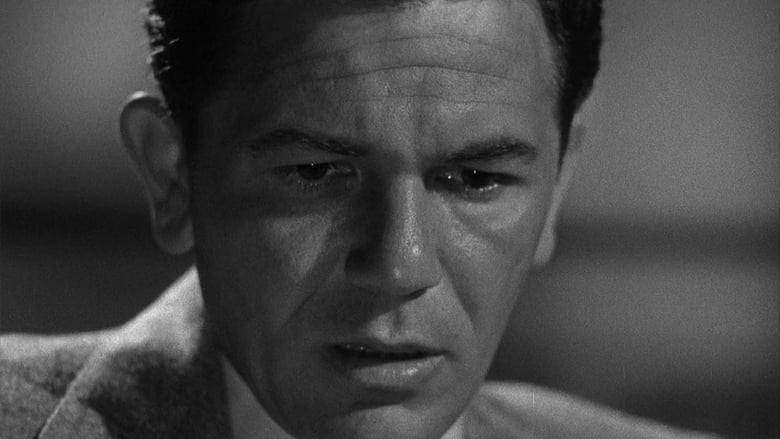
Force of Evil (1948)
Lawyer Joe Morse wants to consolidate all the small-time numbers racket operators into one big powerful operation. But his elder brother Leo is one of these small-time operators who wants to stay that way, preferring not to deal with the gangsters who dominate the big-time.
Watch Trailer
Cast
Similar titles
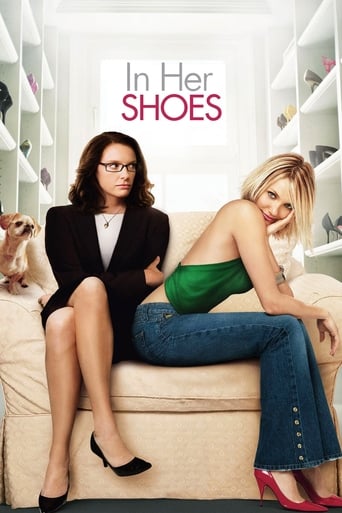
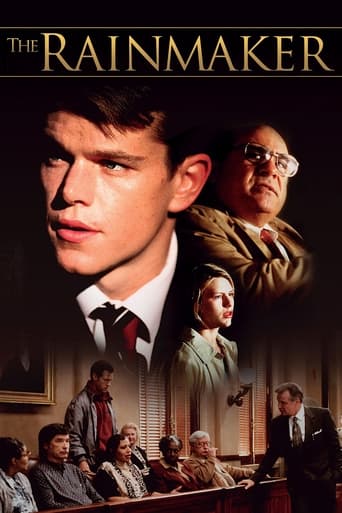
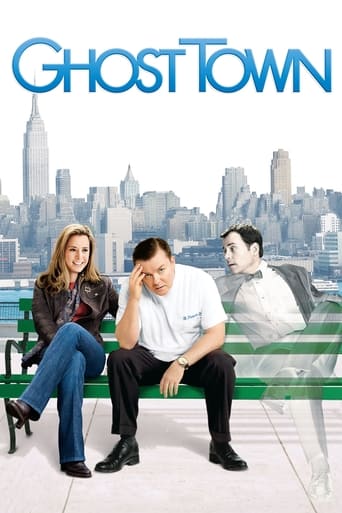
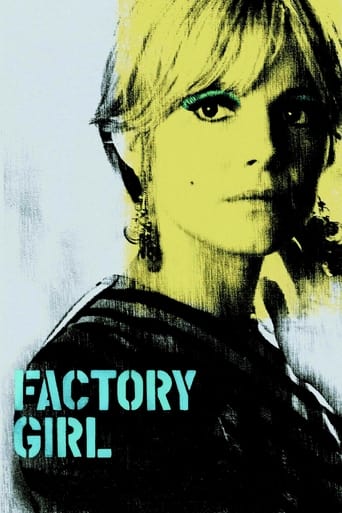
Reviews
Good movie but grossly overrated
Instead, you get a movie that's enjoyable enough, but leaves you feeling like it could have been much, much more.
Exactly the movie you think it is, but not the movie you want it to be.
The movie's not perfect, but it sticks the landing of its message. It was engaging - thrilling at times - and I personally thought it was a great time.
interesting. pledge for basic things. picture of seduction root. drawing about limits of truth. and touching testimony about force of feelings.after so many years, it is , in many senses, naive and common. part of series with gangsters, family tragedies, damned heroes and innocent girls who saves soul of a Raskolnikov. in fact, it is profound search of reality forms. the levels of crisis, the life as dangerous game, the family abysses, the need to save your conscience far from mud of compromises, desire to give / have beauty not as symbol of normal existence but as proof of run against evil. a strange film, seductive, dark and full of shadows. lesson about deep night and first light of morning. must see it ! for discover few good questions.
Force of Evil is directed by Abraham Polonsky, who also adapts the screenplay from the Ira Wolfert novel Tucker's People. It stars John Garfield, Thomas Gomez, Beatrice Pearson, Marie Windsor, Howard Chamberlain and Roy Roberts. Music is by David Raksin and cinematography by George Barnes. Plot finds Garfield as lawyer Joe Morse, who works for powerful gangster Ben Tucker (Roberts). Tucker has a plan to control all of the numbers rackets in New York, something that with the fix on the numbers up and coming for the 4th July, will see all of the smaller number rackets go bust. This is a problem for Morse because his big brother Leo (Gomez), is one such operator, an honest good guy who did everything he could to ensure that Joe had a proper start in life. It has come to be regarded as an influential and important movie in the film noir pantheon. Big critics, big film makers and film noir aficionados, all have queued up to salute Polonsky's film. If it's worthy of such elegant praise will always be debatable, but film does have a uniqueness about it, using stylised dialogue passages and in opening up a corrupt and socially bankrupt can of worms for the cinema loving world, Polonsky has crafted a thematically potent 1940's crime picture. The exchanges between Garfield and love interest Pearson, have an almost poetic flow to them, this in a film that for most of its running time shows that badness can not be beaten, or at best that it can't be railed against or broken away from so easily. While the biblical tones, both allusions and allegorically speaking, also give the picture some added power. Though mostly talky in the main, it does burst into shocking violence for its final quarter, with a finale that contains distress segueing into the possibility of spiritual regeneration ..or maybe that, too, will prove futile? Added to the biting narrative are great cast performances and evocative music scoring, and with skilled location photography adding authenticity, it's not hard to see why it has come to be so revered. Not as bleak as the title suggests, and veering a bit close to being too arty for its own good sometimes, but still a fine experience and it rewards more on further viewings. 8/10
If Dutch Schultz was not the top Jewish racketeer of the 1930's he certainly was the most infamous. A sort of John Gotti of his day, "the Dutchman" loved the limelight and portrayed himself as a public benefactor instead of the sadistic skinflint he really was.Yet with all his eccentricities, Schultz was the first to see that the dimes and nickels poor people bet on the Numbers could add up to millions a year if properly organized. When several of the Harlem Numbers bankers couldn't pay off the winners and turned to Schultz for a bailout, Schultz provided the financing but took over the banks, and most of the profits, wisely leaving the street-level organizations with their controllers and runners intact, just as in the movie.And just as in the movie, Schultz employed an accountant, one Otto Berman, said to be a mathematical genius, to fix the winning Number by placing a bet at the racetrack just as betting closed so as to throw the "handle" off a heavily bet number.In 1943, long after Schultz had been killed in a mob rubout, sports writer and war correspondent Ira Wolfert wrote a novel loosely based on the crime career of Dutch Schultz. Wolfert also collaborated on the screenplay of "Force of Evil" which was based on a part of that book. Wolfert undoubtedly is responsible for the strikingly clever tone of the narration and much of the dialog's eloquent yet realistic style."Are you telling me, a corporation lawyer, that you're running a legitimate business here?" demands the protagonist of his numbers banker brother, in exasperation at his stubborn refusal to accept a mob takeover.This picture is 63 years old. An issue arises early on of remarkable relevance today: how close a mob lawyer can get to his clients before the law treats him not as legal counsel but as a participant in the criminal enterprise. "Lawyers are nor protected from the law," as one character succinctly puts it.When attorney Bruce Cutler was disqualified from representing John Gotti on just those grounds, Gotti's lucky charm deserted him and the former "Teflon Don" died in a Federal prison.John Garfield was a fast talker and he never lost nor tried to hide his Lower East Side accent. Yet because he had stage experience every word of every line is understood. He did not mumble or swallow his words--so different from some of the so-called movie stars of today. Accordingly the former slum kid and inmate in reform school John Garfield is believable in perhaps the only role of his short film career where he wears a finely tailored suit, compete with vest and watch chain in the style of the time.
Joe (John Garfield) plays a corrupt lawyer who is in partnership with gangster Ben Tucker (Roy Roberts) to control the "numbers" game. Joe tries to help his brother Leo (Thomas Gomez) who operates an illegal small bank for betting who is going to be made bankrupt by a fixed scam that will make banks pay out more than they have. The idea is for the gangsters to then come in and take things over. Leo refuses to listen, but is forced to draw himself into the new conglomerate that Ben Tucker is organizing. A rival gangster turns up wanting a share of the spoils from this particular scam and as a result of a killing and a kidnap, and phones being tapped by the prosecutor's department, the whole set-up is brought before a court.This is a boy's film about gangsters and it can get pretty confusing if you don't pay attention throughout. The female roles are irrelevant to the plot which is a shame in the case of Marie Windsor who plays "Mrs Tucker". She is the best of the cast in her scenes and she completely outshines the rather feeble and bland Beatrice Pearson who plays "Doris". I also found the love interest between John Garfield and Peatrice Pearson difficult to believe. The acting is generally good with Thomas Gomez also deserving a mention. I didn't like him at the beginning but he managed to change my opinion so that I was sympathetic to him towards the end.In fact, the end section of the film is the most memorable with several good scenes including a set-up in a cafe, a confrontation between the main bad guys, clever use of the telephone bugging operation and a discovery on some rocks under a pier. Unfortunately, I lost interest in the film whenever Beatrice Pearson was on screen, which seemed like way too much, and the story can get confusing, so the film loses points on those accounts.It's a film that has a message similar to "On The Waterfront" in saying that the only way to topple powerful gang cartels is to stand up to them legally.
